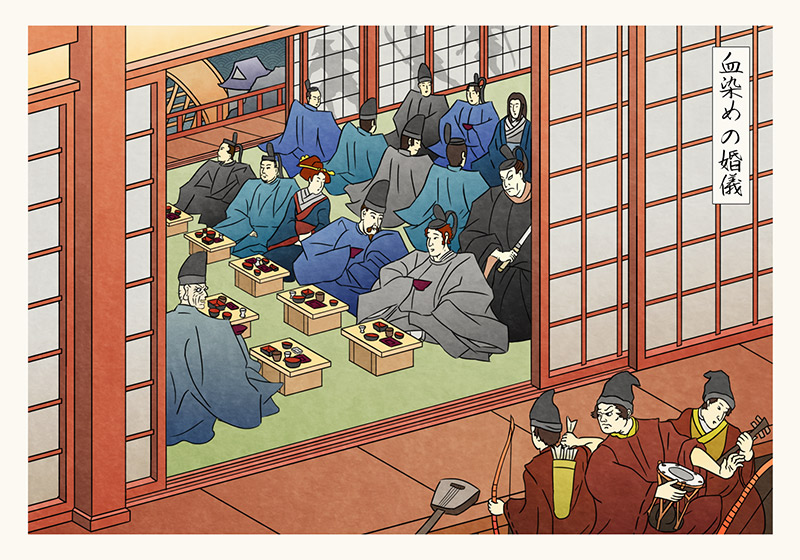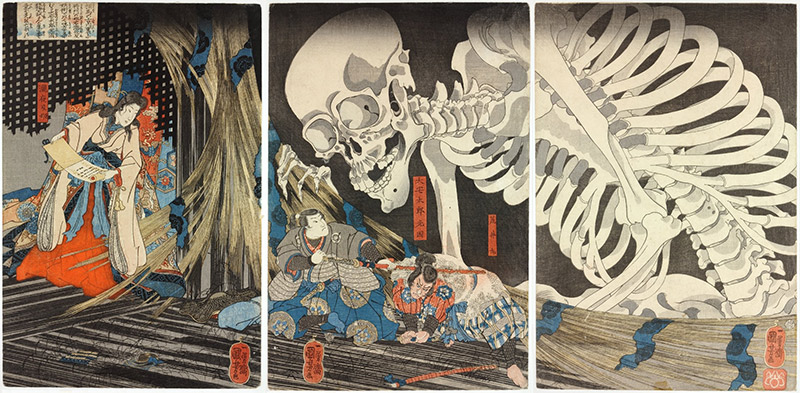I talked about Kobun adjectives last time, but you might want to review verbs and jodoushi before reading this. You should also know how Modern Keigo works. Review those because, this time, I'm outlining honorifics in Classical Japanese, including verbs, prefixes, and some special nouns.
The scale of respect shown in honorific language helps you to identify sentence subjects. I've mentioned before that Classical Japanese frequently omitted sentence subjects (like Modern). So to figure out who is honorably on first and what's humbly on second in the monogatari's, honorifics can be a big clue. A possible side benefit from reading this article, is that you might indirectly improve your Modern Keigo.
Respectful Language

Imagine you're a writer in the Heian Times, and you want to tell people about your nobleman landlord. If he heard you'd been talking about him like you were an equal there'd probably be a punishment of some sort. The following are words you would use to avoid getting your head chopped off while talking about the higher-ups. If you want in-depth examples of navigating different formalities in Classical texts, see the video below (Japanese):
The Nobleman Gave
There's mostly just one word for honorific "give", and it's a very important Kobun word: tamafu 給ふ. Tamafu's Modern counterpart, tamau 給う means "receive/give", which goes back to how this verb, on its own, also meant "receive/give" in Classical Japanese. That makes it sound contradictory, doesn't it? If you're confused about which meaning is true, "receive" or "give", then just think of how Modern kudasaru and itadaku work; who receives what from whom are questions answered by the particles involved. You'll have to pay attention to that stuff with tamafu and other honorifics, too.
Kobun:「いざたまへ、出雲(いづも)拝みに。かいもちひ召させん」(From Tsurezuregusa)
Modern: さあ、いらっしゃい、出雲神社の参拝に。ぼた 餠をごちそうしよう。(context explanation here)
English: "Come… . let us worship at the Izumo Shrine. We'll have . . . rice cakes" (Keene 192).
The Nobleman Was
Tamafu means more than "to honorably bestow upon someone". It's like Modern nasaru ("to honorably do") and irassharu ("to honorably be"). If this Yodan tamafu is immediately preceded by a verb, then, just like with Modern "~ni naru", the whole verb phrase is elevated to respectful language.
Tamafu isn't the only Kobun verb equivalent to Modern nasaru, irassharu, and ni naru. おはす is an honorific expressing the "go/come/relocate/is" parts of irassharu. Then there's つかはす, which is "to honorably do", with an added meaning of "to honorably send".
There's also a kind of super honorific form, called Saikou 最高 Keigo, which was reserved for discussions of emperors, their families, and even those royal-marrying Fujiwara's of yore. Saikou Keigo is expressed using one of two former jodoushi, せ or させ, plus tamafu, but you should consider せたまふ and させたまふ each as a set verb. Both mean "nasaru" or "irassharu."
Here's just one sampling of Saikou Keigo:
Kobun: 「人の謗りをもえはばからせ給はず」 (From Genji Monogatari)
Modern: 桐壺帝は人々の非難をも気兼ねなさることもおできにらならないで。
English: "But the Emperor… paid not the smallest heed to those who reproved him" (Waley 7).
The Nobleman Said

おほす, like modern おっしゃる, means so-and-so "honorably says" something. You'll likely see it before or after quotations. おほす could also be "to command" or "appoint".
Kobun:「大将おほせて、『おり』とのたまふ」(From Makura no Soushi)
Modern: 大将が命じて「下りよ」とおっしゃる。
English: "Come down," the general ordered.
Now I should mention the chimaera of honorifics: mesu 召す (easy enough to remember because this word is a mess). Its basic meaning is "to summon or call upon", but it can also be an honorific for "govern", "see", "eat", "ride", or "wear". Mesu can also tag onto another verb and make a ~ni naru type honorific phrase, as in 思し召す.
The Nobleman Knew
(shiroshimesu) 知ろし召す is like Modern ご存知である – "to honorably know / be aware of." It can also mean osameninaru 治めになる – "to govern" or "manage." Those meanings sound incongruent. But just think of how a queen has subjects in the land she reigns over, but she can also be proficient in the subjects of math and astronomy. Those subjects are different (one being "constituents", the other being "topics of scholarly focus"), but the word used is the same.
Kobun:「かかるに今 天皇の、 天の下しろしめすこと」(From Man'youshu)
Modern: 今上天皇が天下を統治なさることが
English: "In the reign of our [peerless] emperor" (Rodd 46)
While we're talking about what's in this nobleman's head, I may as well mention omohosu 思ほす, equivalent to the Modern "お思いになる" – "to honorably believe/think/consider." There are some variations on this, including obosu 思す and oboshimesu 思し召す, but they all mean the same thing.
The Nobleman Ate

You've noticed, surely, that half of these words have more than one meaning. I mentioned how mesu 召す expresses "to honorably eat" in addition to it's crazy collection of other meanings. kikoshimesu 聞こしめす is another indecisive honorific. Its base meaning is "to ask/listen," with an additional meaning of "to be concerned with" and "to manage," and, finally, "to consume." That goes for food and drink.
Altogether, that's a long list of honorable words to remember. Songs, like the one below, should help keep things simple and fun:
Humble Language
Now, back to you: the Heian Times writer. You want to pen a memoir. When it hits the market, you hope readers think you are cool, but not in an arrogant way. So your editor advises that you describe your past actions with some of these humble words.
I Gave

The first humble verb for "to give" is pretty straightforward: mairasu 参らす. The other two have a medley of other meanings. tatematsuru 奉る, for example, can mean "humbly give", but also "to humbly eat", "drink," or "wear." Then there is mawiru 参る, which is so much like modern polite 参る(まいる), meaning not only "to humbly give", but also "to serve", "go"," "come," "visit," and "do." (Of those, only the movement words really hold true in Modern 参る.)
Kobun:「いかにもしてたすけまゐらせんとは存じ候(さうら)へども」(From Heike Monogatari)
Modern: どうにかしてお助け申し上げようとは存じますが。(the whole passage here in both Kobun and modern)
English: I would spare you if that were at all possible.
I Received
"To Humbly receive" is also a mixed bag. First, tabaru, tamaharu 賜はる is a humble verb for "to receive", and that's pretty much its main meaning. But then there's uketamaharu 承る, which is a humble form of "accept" or "receive", but also "to listen."
Finally, (and this is where the song videos help dramatically), there is the Shimo-nidan verb tamafu 給ふ. Yes. It's the exact same kanji and dictionary form as in the Yodan verb 給ふ. When each one conjugates, the endings differ sometimes, and, obviously, the meaning differs, too. This tamafu means "to receive the privilege of…." and is like modern sasete-itadaku.
Kobun: 「今はこの世のことを思ひたまへねば」 (From Genji Monogatari)
Modern: 今は現世のことは考えさせていただきませんので。
English: Because, humbly, now, I think no longer of worldly things…
I Was
I'm calling this section "I was" because these words mirror how the Kobun equivalents of irassharu, nassaru, and ~ni naru have overlapping meanings.
Let's start with one you should already know: itasu 致す – "to humbly do", as in the Modern 失礼いたします. Then, again, 参る has some meanings for "do", but also for "go/come/visit." Since 参る, like itasu, looks familiar, it shouldn't be hard to remember. A new one, however, might be まかる, which means "to humbly go," or sometimes just "to humbly ~" if it compounds onto another verb.
Kobun: いづ方へかまかりぬる。いとをかしう、やうやうなりつるものを」
Modern:(飼っていたすずめは)どこへ行ってしまったのでしょうか。かわいらしく、だんだんなってきたのに。
English: "Where can it [the sparrow] have gone off to? And this after we had taken so much trouble to tame it nicely!" (Waley 98).
I Said

In your novel, you're going to write "I asked Mr. Mountain-Rice Field what he expects this season from crops." So what's humble Kobun for "ask" or "say" (or even "call")? Here's one word that can do all that, and it's even survived to Modern Japanese: 申す, as in 「山田と申します」.
Next, there's kikoyu 聞ゆ, which originally meant "to hear/be audible", but in situations demanding humble speech, this is actually "to humbly say" or even "to humbly give."
Another word won't ring any bells but hits the same "to say" spot: keisu 啓す. Keisu is equivalent to the modern 申し上げる, which is just "to humbly say." One of the ways you can write a Japanese letter is with the set greeting haikei 拝啓. That second kanji is the same as in keisu, see?
Speaking of addressing people, the emperor is one person you've spoken to. That is, you have been privileged to humbly speak to the emperor. So heed this word, Kobun language user, when you write about that experience: sousu 奏す, which is like keisu 啓す when the person addressed is the emperor or the royal family.
I Knew
You think you know things, writer? You want to open your novel with the line, "I know this guy named Prince Genji, and I think he's an idiot"? Stay classy and use the word zonzu 存ず. It means "to humbly know," "think," or "consider/believe." Then your sentence will sound more like, "I am but a petty aquaintance of Prince Genji, and I humbly believe he's an idiot." Much better, isn't it?
Kobun:「ただ一身の嘆きとぞんじ候ふ」 (From Heike Monogatari)
Modern: …ただ我が身の嘆きと思うことでございます。
English: When I think of the sadness of it…
Check out all of these and a couple other humble forms in the fun song below. Listen to it enough and you'll have them memorized!
Beautifying Prefixes

Now, writer. You want to make sure your audience thinks that the things you mention are awesome. It's nice to sound humble about your actions, but there's no reason other things can't have some flourish. So, you don't just eat senbei, you eat osenbei. Enter the beautifying prefixes.
Two such prefixes still exist in Modern: お- and ご-. Nowadays, お- (sometimes を in Kobun texts) is used for kun'yomi words, while ご- is used mostly for on'yomi vocabulary. But that distinction isn't a modern innovation. お- and ご- act pretty much the same in Kobun texts.
According to Vovin in A Reference to Classical Japanese Prose, the Kobun prefix み- is mostly paired with kun'yomi words, but "can also be used in combination with words of Chinese origin, probably those that were more nativized than others" (30). He then describes three vocabulary categories that pair with み- regardless:
- "Human appearance, body parts, and secretions" (30, like tears or voice)
- "Dwellings, buildings, and their parts" (31)
- "Kinship terms" (32)
Nowadays, the み-prefix is permanently a part of certain words, like mikoshi (a mini, portable shrine) and isn't detachable the way the お- in おせんべい or ご- in ご飯 are.
It's hard to tell, though, which prefix you're looking at if Kobun writers used the kanji 御, which could not only read お-, ご-, or み, but also おほん or おおん. おほん and おおん are two sides of the same coin and form an interesting pronoun-like prefix. See this example, where おほん stands in for something previously mentioned:
Kobun:「対の上のおほんは、 三種ある中に」(From Genji Monogatari)
Modern: 対の上の(合わせられた)お(香)は、三種類ある中で。
English: "Murasaki had submitted three kinds" (Waley 691) of incense to the contest.
There's one more pretty prefix to talk about, which builds on the same kanji. 「大御」 reads 「おほみ」, and a noun following it won't just sound cool. That noun will sound super respected. 大御 usually preceded vocabulary for emperors, gods, shrines, or parents.
Ending Grammar

This is the last post on Kobun grammar. However, there is one important thing I've left alone throughout this series that you can expect soon. If you listened to any of those songs I linked, you'll notice that the way Kobun words were written wasn't how they get pronounced. There are rules governing those sound discrepancies which can improve your interpretations of Classical texts. Until now, I've (deliberately) just provided links to guides on old kana. But rest assured, I'll still be writing a post to walk you through the rules of reading Kobun kana and why it's helpful to know said rules.
Meanwhile, Hello-School has a larger chart to help you solidify your knowledge of Classical honorifics. I hope both your Kobun and your Modern Keigo muscles flexed a little after reading today. This post only covered prefixes and verbs, but I've read about other sentence elements, like pronouns and plurals, that border honorific language. So, if you're curious about those or want to share your Kobun/Modern Keigo stories, make like Murasaki and write something on Twitter.
